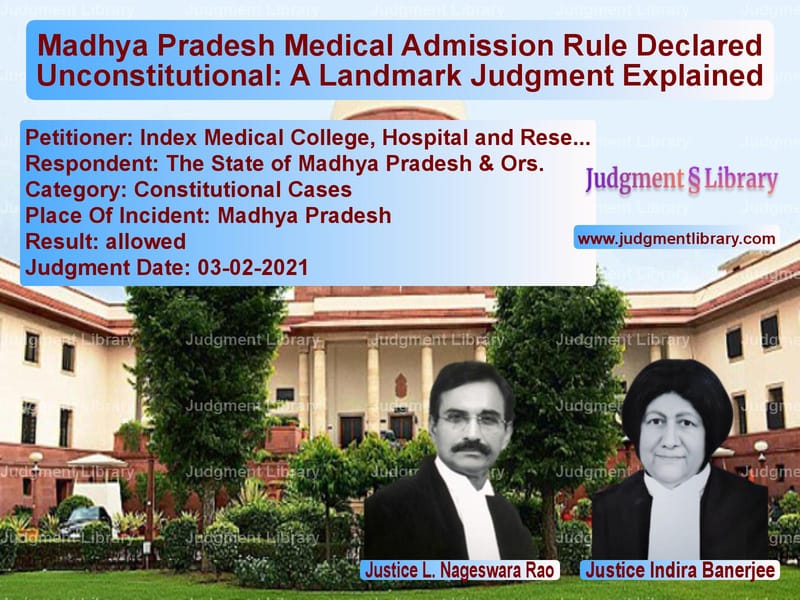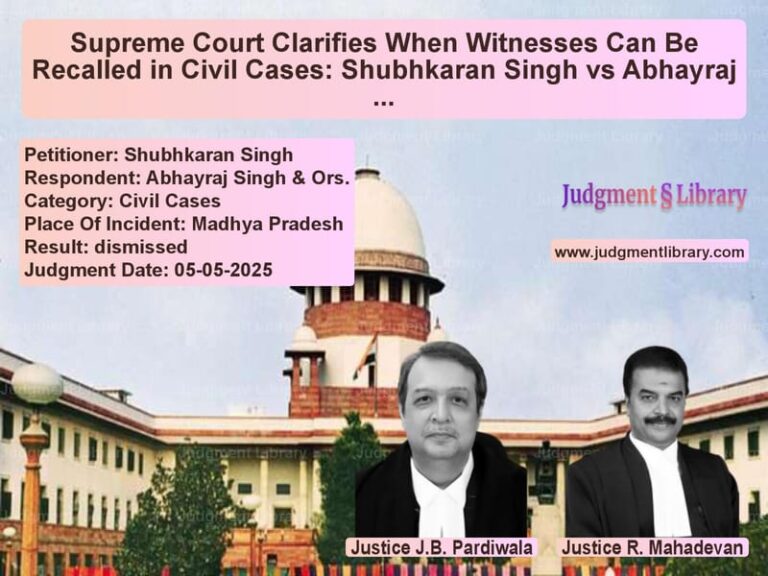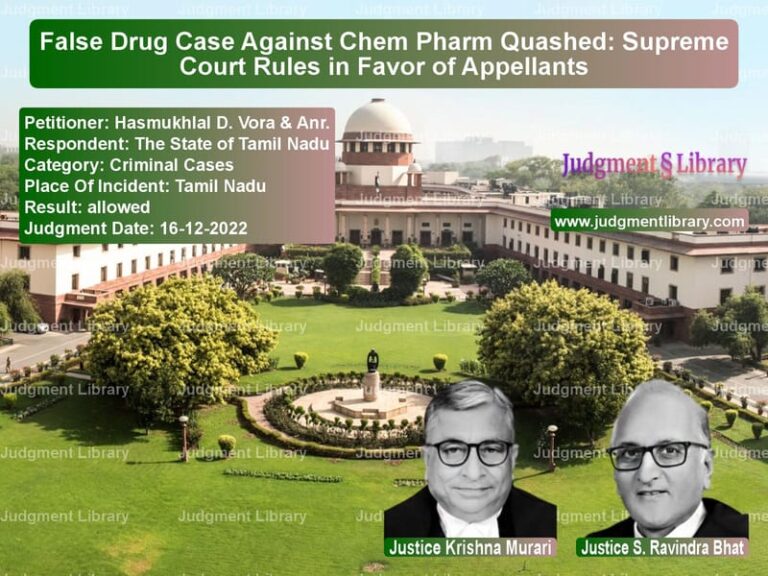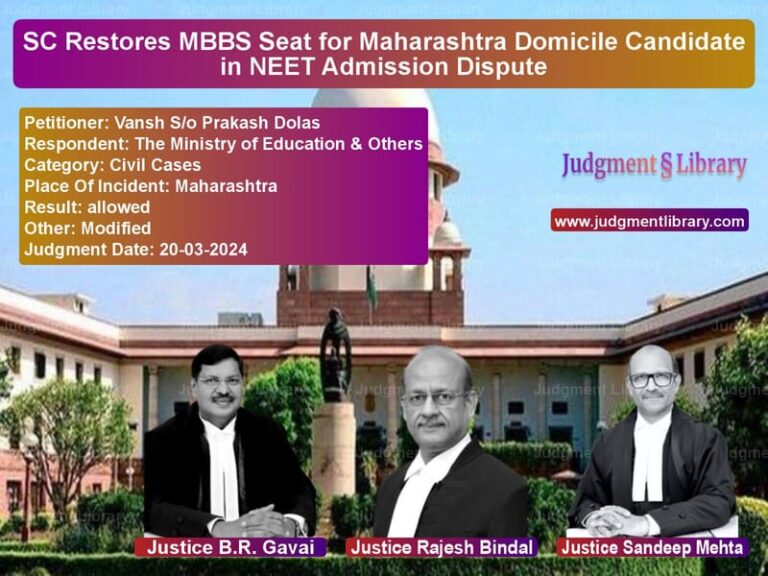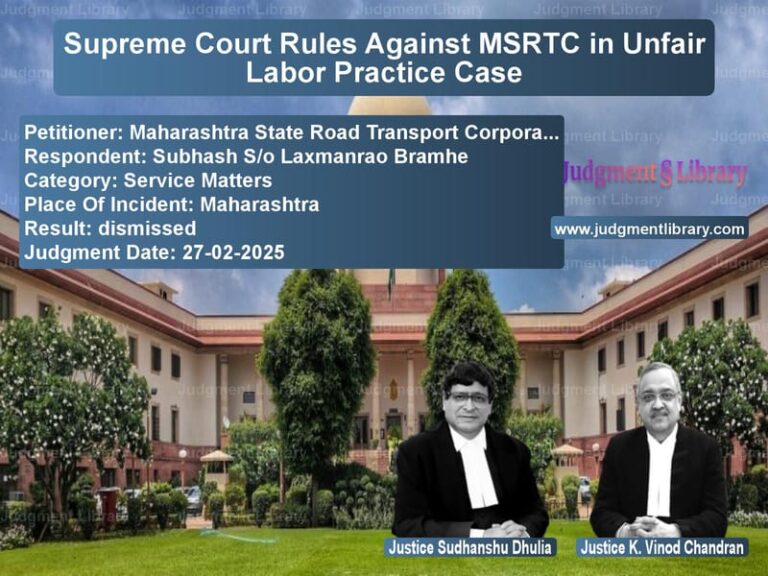Madhya Pradesh Medical Admission Rule Declared Unconstitutional: A Landmark Judgment Explained
The Supreme Court of India, in a significant ruling, declared Rule 12(8)(a) of the Madhya Pradesh Chikitsa Shiksha Pravesh Niyam, 2018 as unconstitutional. This decision, which has far-reaching implications for medical admissions in the state, stemmed from multiple petitions filed by private medical institutions challenging the validity of the rule. The case revolved around the issue of whether prohibiting the filling of vacant medical seats post-mop-up round was a violation of fundamental rights.
Medical admissions in India follow a structured process that ensures transparency and merit-based selection. However, the amendment to Rule 12, specifically Rule 12(8)(a), introduced in 2019, barred institutions from filling vacant seats left unoccupied after the mop-up round of counseling. The petitioners contended that this rule unfairly impacted private medical colleges, leading to wastage of valuable resources, financial losses, and deprivation of opportunities for deserving students.
Background of the Case
The controversy began when Index Medical College, Hospital, and Research Centre, along with other medical institutions, challenged the constitutional validity of Rule 12(8)(a) before the High Court of Madhya Pradesh. The petitioners argued that preventing the filling of vacant seats post-mop-up round was arbitrary and contrary to the principles of fairness and justice. However, the High Court dismissed their plea, upholding the rule as a necessary measure to curb manipulations in the admission process.
Aggrieved by this decision, the petitioners approached the Supreme Court, seeking relief. The apex court granted leave and heard the appeals, leading to a detailed examination of the constitutional and legal implications of the rule.
Petitioner’s Arguments
The primary contention of the petitioners was that Rule 12(8)(a) imposed an unreasonable restriction on their right to carry out their occupation, which is protected under Article 19(1)(g) of the Constitution of India. They argued:
- The rule directly impacted the ability of medical institutions to admit students and utilize their infrastructure effectively.
- Prohibiting the filling of vacant seats post-mop-up round resulted in financial losses for private institutions.
- The rule led to a waste of national resources, as medical seats remained vacant despite the availability of eligible candidates.
- The restriction was arbitrary and lacked a rational nexus with the objective of ensuring fair admissions.
- While preventing manipulations in admissions was a legitimate concern, the chosen method was excessive and disproportionate.
They further contended that medical admissions are regulated through a structured process involving multiple rounds of counseling. The final mop-up round allows institutions to fill remaining vacancies, ensuring that no seat goes unutilized. The rule in question disrupted this process by mandating that seats left vacant due to non-joining or resignation could not be reallocated, leading to avoidable inefficiencies.
Read also: https://judgmentlibrary.com/maharashtras-gond-gowari-tribe-dispute-supreme-courts-landmark-verdict/
Respondent’s Defense
The State of Madhya Pradesh defended the rule, asserting that it was introduced to curb malpractices and ensure transparency in medical admissions. The government’s key arguments included:
- Manipulations in the admission process had been observed, where students with lesser merit were securing seats through unfair means.
- The rule was necessary to prevent seat-blocking tactics, where candidates would resign after securing a seat to benefit another individual.
- Ensuring that only deserving candidates obtained medical seats was in the larger interest of maintaining merit-based admissions.
- Previous judicial directives had emphasized the need to curb manipulations in the mop-up round to protect the integrity of the admission process.
The state argued that Rule 12(8)(a) was framed in response to concerns raised by the judiciary and aimed at preventing fraudulent practices. By prohibiting the refilling of vacant seats, the rule sought to deter candidates from misusing the system.
Supreme Court’s Observations
The Supreme Court undertook a detailed examination of the legal and constitutional aspects of the case. The bench observed that:
- The rule imposed an excessive restriction on the rights of private medical institutions.
- Keeping seats vacant did not serve the intended purpose of transparency but instead resulted in a waste of educational resources.
- Medical colleges had a legitimate right to fill vacant seats through a fair and transparent process.
- The restriction lacked proportionality and failed to balance regulatory objectives with the fundamental rights of institutions.
The court emphasized that while regulatory measures are essential to maintain fairness in admissions, they must not lead to unintended consequences that harm institutions and students. The blanket prohibition on filling vacant seats was deemed excessive and not the least restrictive means to achieve the intended objective.
Key Legal Findings
In reaching its decision, the Supreme Court relied on established legal principles, including:
- Proportionality Test: The court applied the principle of proportionality to assess whether the restriction was justified. It concluded that the rule imposed a disproportionate burden on medical colleges.
- Article 14 (Right to Equality): The rule created an unreasonable classification that lacked a rational connection to the stated objective.
- Article 19(1)(g) (Right to Practice Any Profession): The restriction directly interfered with the rights of private institutions to admit students and manage their affairs.
- Wastage of Resources: The court acknowledged that leaving medical seats vacant was detrimental to public interest and national educational goals.
Based on these findings, the Supreme Court concluded that Rule 12(8)(a) was unconstitutional and struck it down.
Impact of the Judgment
The ruling has significant implications for medical admissions in Madhya Pradesh and across India:
- Medical colleges can now fill vacant seats post-mop-up round, ensuring optimal utilization of resources.
- Students will have greater opportunities to secure admission, reducing unnecessary vacancies.
- The judgment reaffirms the importance of balancing regulation with fairness in education policies.
- Other states may need to review similar regulations to ensure compliance with constitutional principles.
Conclusion
The Supreme Court’s decision to strike down Rule 12(8)(a) marks an important step in upholding fairness and transparency in medical admissions. While preventing malpractices is crucial, regulations must not impose undue restrictions that result in inefficiencies and resource wastage.
By emphasizing the principles of proportionality and fairness, the judgment ensures that medical institutions can function effectively while maintaining the integrity of the admission process. This landmark ruling sets a precedent for future cases where educational policies may come under judicial scrutiny.
Petitioner Name: Index Medical College, Hospital and Research Centre.Respondent Name: The State of Madhya Pradesh & Ors..Judgment By: Justice L. Nageswara Rao, Justice Indira Banerjee.Place Of Incident: Madhya Pradesh.Judgment Date: 03-02-2021.
Don’t miss out on the full details! Download the complete judgment in PDF format below and gain valuable insights instantly!
Download Judgment: index-medical-colleg-vs-the-state-of-madhya-supreme-court-of-india-judgment-dated-03-02-2021.pdf
Directly Download Judgment: Directly download this Judgment
See all petitions in Fundamental Rights
See all petitions in Constitution Interpretation
See all petitions in Public Interest Litigation
See all petitions in Legislative Powers
See all petitions in Judgment by L. Nageswara Rao
See all petitions in Judgment by Indira Banerjee
See all petitions in allowed
See all petitions in supreme court of India judgments February 2021
See all petitions in 2021 judgments
See all posts in Constitutional Cases Category
See all allowed petitions in Constitutional Cases Category
See all Dismissed petitions in Constitutional Cases Category
See all partially allowed petitions in Constitutional Cases Category

